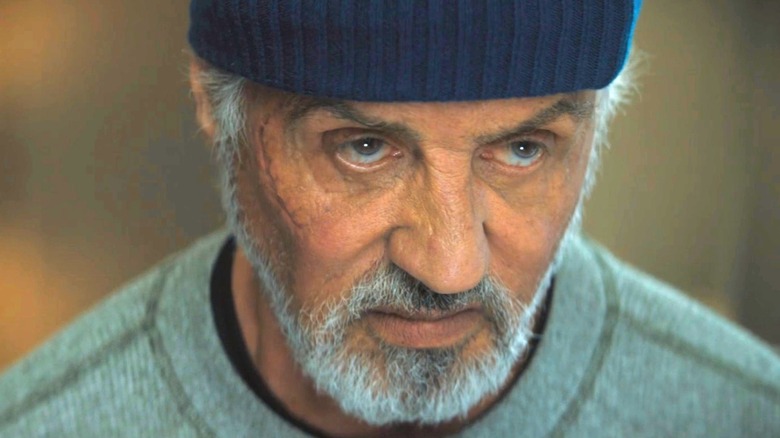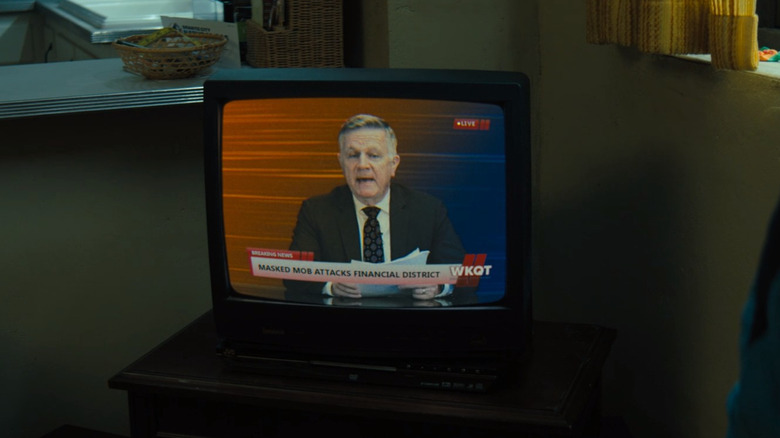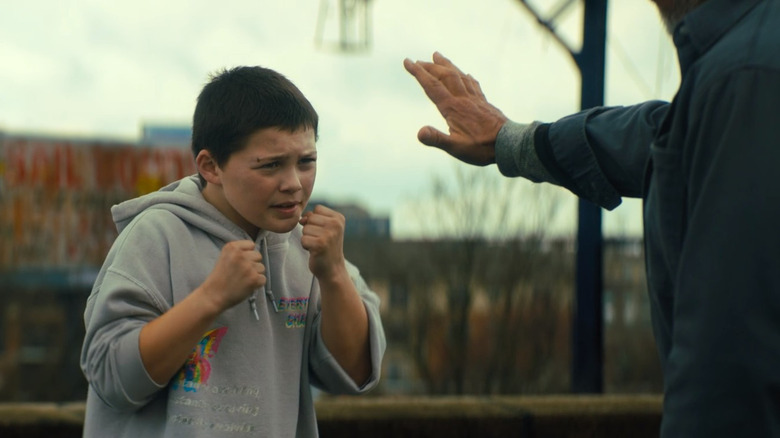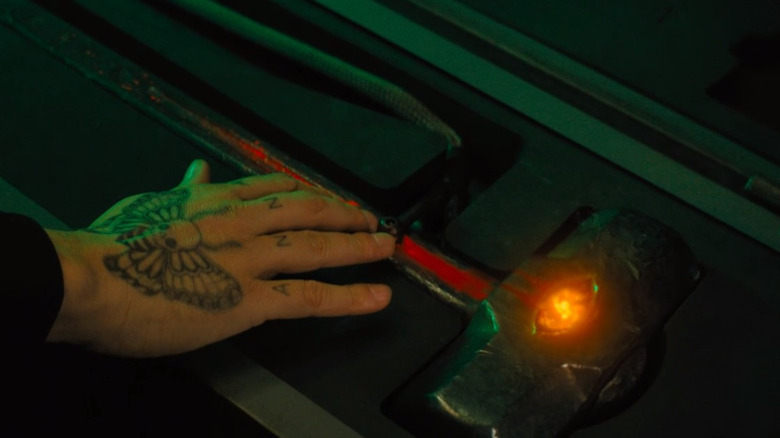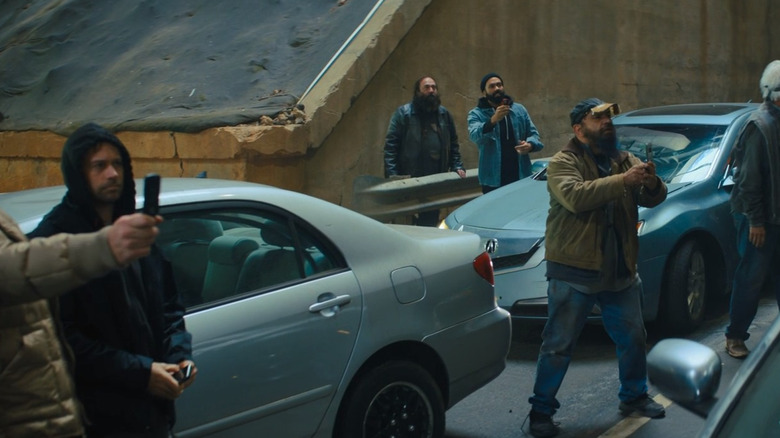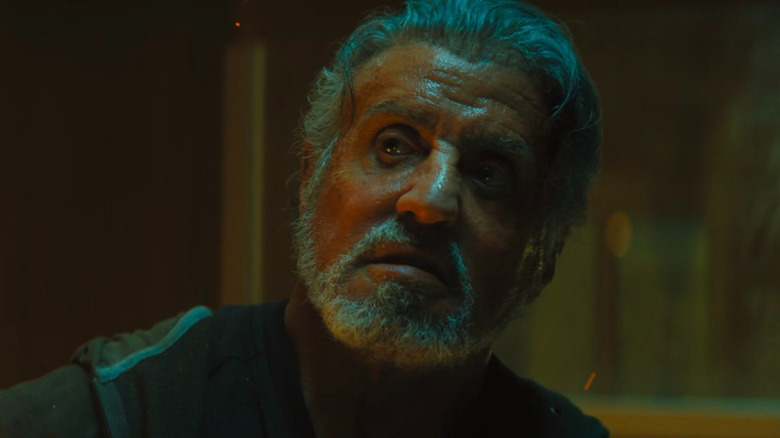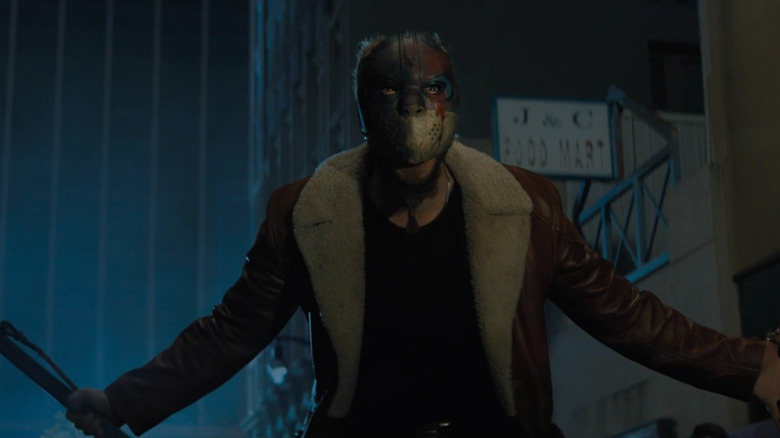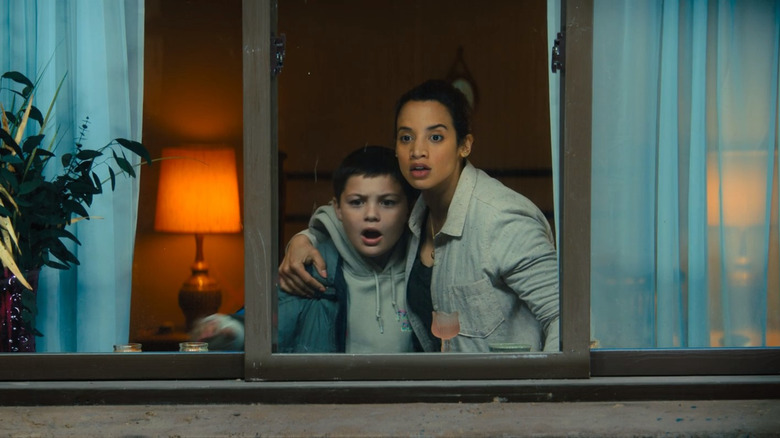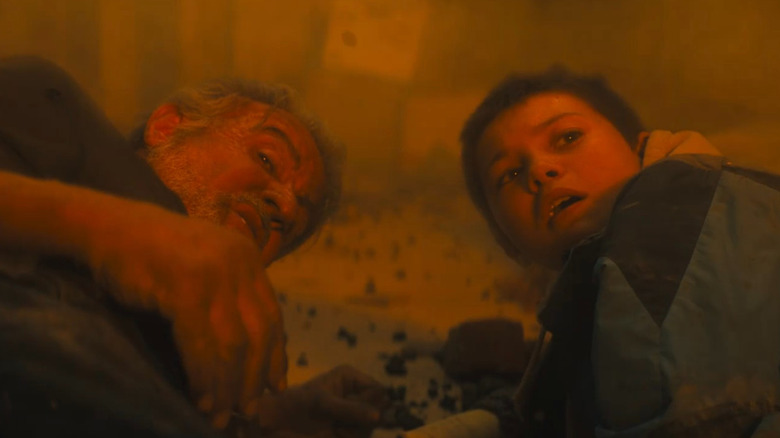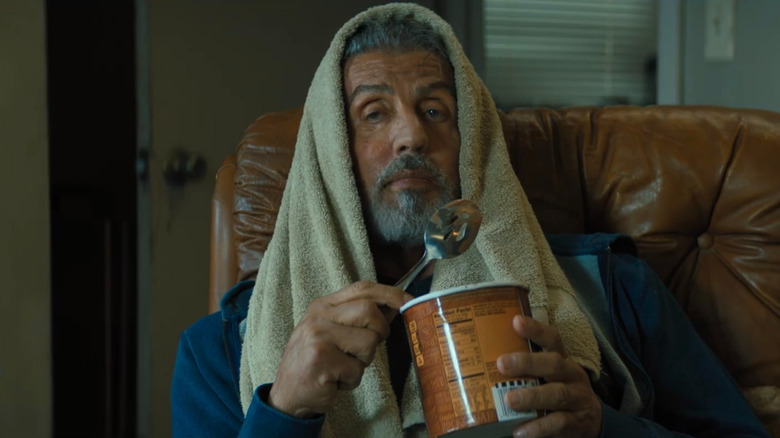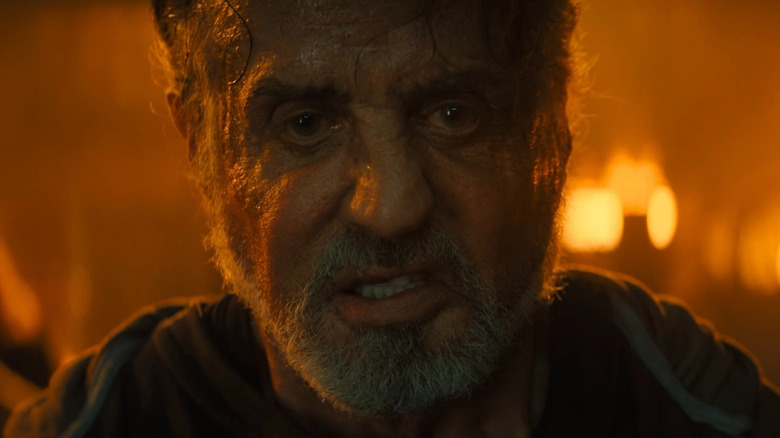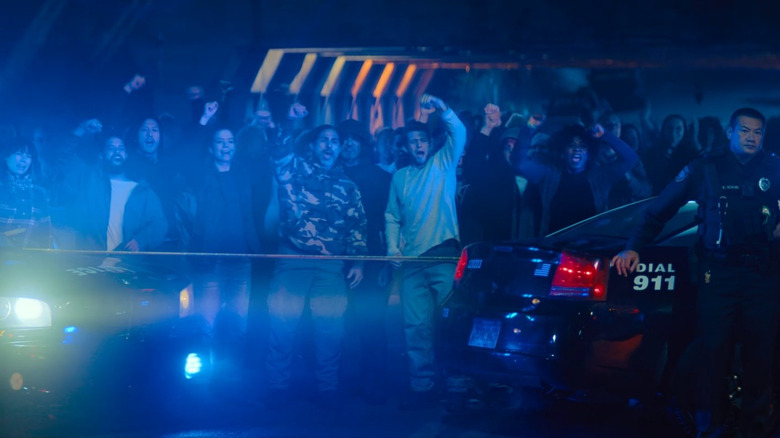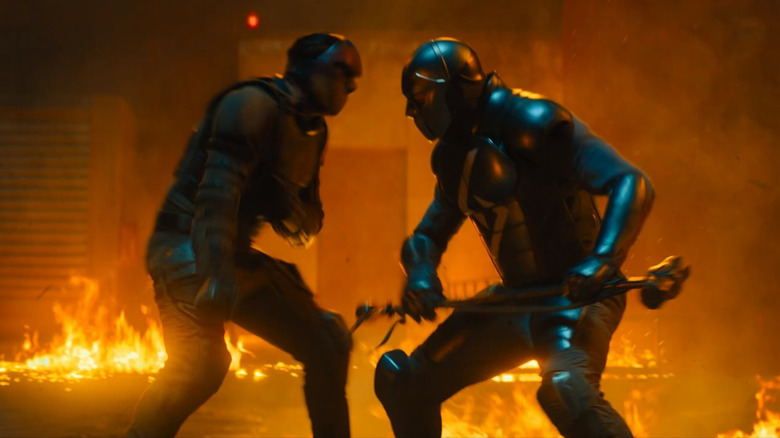Samaritan's Most Ridiculous Moments Ranked
"Samaritan" boldly asks the question: What if "Unbreakable" had a lot more action and a bit more humor, but made a lot less sense? Like a strange combination of "The Dark Knight Rises" and "Rocky," "Samaritan" attempts to say something deep and timely about good and evil, while also commenting on star Sylvester Stallone's career in a fun meta way. But ultimately, it collapses under its own weight rather spectacularly, as it takes wild swings that rarely land the way they were intended to.
"Samaritan" is set in a cartoonish world of colorful gangsters, hand-wringing news anchors, and chaotic blackouts. The citizens of the fictional Granite City seem to do nothing but talk about the legend of super-powered twins Samaritan and Nemesis — one good and one evil — even though both died in an explosion 25 years ago. But when a young boy named Sam (Javon Walton) suspects that his garbageman neighbor Joe (Stallone) is actually the "good guy" back from the dead, a thoroughly silly story full of explosions and Stallone's gruff mumbling follows. These are the most ridiculous moments in "Samaritan" ranked from least to most unbelievable.
Warning: major spoilers below.
Every local news clip
Things are bad in Granite City, and we know this because it's all the local news anchors ever talk about. "Samaritan" wants to make it very clear that times are tough. While an early scene of Sam's mother Tiffany (Dascha Polanko) asking her son for his allowance money back so she can take the bus to work obviously illustrates how bad things are, the film decides to rely on these news reports to really hammer the point home. In between the requisite reports about the nefarious actions of the villainous Cyrus (Pilou Asbæk) and the rumors of Samaritan sightings, the news of Granite City yammers on endlessly about unemployment at record levels, rampant evictions, and an increase in crime.
Based on their own reporting, it sounds like Granite City needs social welfare programs, federal assistance, and maybe even to be declared a disaster area. There's only so much Samaritan could actually help with, but Granite City news channels seem to feel that talking about long-dead superheroes is better for ratings. Based on their obsession with crime and superheroes, it's a wonder the anchors don't slip up and accidentally say "Gotham City" (although it's unclear if Batman comics exist in this world).
A shameless Rocky moment
It's an unwritten and unbreakable rule that any "Rocky" movie has to contain a training montage, and apparently that applies to Sylvester Stallone's non-"Rocky" filmography as well. About halfway through "Samaritan," Sam asks for fight training out of nowhere, and he and Joe head up to the rooftop for a classic sparring match in the requisite sweats. Perhaps it's a stipulation of Balboa Productions, Stallone's aptly-named company that co-produced the film, that Sly has to lecture somebody about their footwork at some point.
You can't fault the movie for going for the sentimental visual reference, but it doesn't particularly track with Sam's character. He does get beat up a fair amount, but only because he's younger and smaller than the gang kids that bully him. Joe even tells him that the bigger virtue is knowing when to run away — the next time Sam tries to fight, he immediately gets his arm broken. In the end, Sam gets in a key blow on Cyrus to help Joe in the final battle, but it's not clear if his one brief boxing lesson actually played a role.
The forging of the hammer
One of the most ridiculous aspects of "Samaritan" is how little it explains its superhero mythology compared to how seriously it seems to take it. The legend of Samaritan and his equally powerful evil brother Nemesis gets inexplicably complicated by the creation of a mythical hammer. Nemesis forged the hammer and "poured all the hatred he had for his brother into it," which somehow makes it the only weapon capable of hurting Samaritan? At no point in the movie do we get any indication that either brother has anything beyond super-strength or durability, but now one of them is forging an evil hammer made of hatred, like Sauron's One Ring?
When Cyrus and his crew waltz into a police evidence locker and steal the hammer, the tool glows and displays a lot of raw power. But it's hard to believe that no one bats an eye when Cyrus (a huge Nemesis fanboy) describes how it was "forged from hatred." No offense Cyrus, but feelings aren't generally known for having physical properties outside of the Care Bears.
The blackout bomb doesn't affect phones
Cyrus' master plan involves the use of stolen military tech called "blackout bombs." No bigger than a grenade, these devices set off huge explosions of swirling blackness that function like an electromagnetic pulse and cause all electronics to go out for entire city blocks. Later, he has a few of them strategically placed at a power plant and when they go off, they sabotage the entire electrical grid of Granite City and cause general mayhem to ensue.
The blackout bombs are a little convenient and plot device-y, but the CGI is pretty cool and it's easy enough to go along with this ... until a scene where Joe saves a little girl from one of these bombs and outs himself as Samaritan. An entire crowd films this moment on their cell phones, which don't seem to be affected whatsoever by the bomb whose primary purpose is to block electronic devices. Afterwards, the local news shows uninterrupted footage of the explosion: It seems like this next-level military blackout tech is no match for a flip phone battery.
The obligatory cheesy one liner
Sylvester Stallone gives a surprisingly naturalistic performance as Joe. Channeling his old "Rocky" combination of toughness and vulnerability, he plays the weariness and misanthropy of the character well and mumbles his way through the predictable beats of opening up to Sam. He only fights reluctantly, and there's no trace of the stoic action movie persona that he's relied on for most of his latter day non-"Rocky" franchise movies. As Sylvester Stallone movies go, it's one of his most humane and endearing performances for the most part.
All bets are off, however, during the chaotic and absurd final showdown at Cyrus's warehouse. After having finally revealed himself as Nemesis rather than Samaritan, Joe taps into what must be a long-dormant detached killer mode, and goes through dozens of henchman that just never know when to give up. At one point, he punches a grenade into a man's chest and arms the bomb. He walks away before it explodes, tossing in a "have a blast" as he does so. It's one of the silliest but also funniest lines in a movie that waffles between comedy and self-parody.
Cyrus' vague Bane speech
When Cyrus puts on the Nemesis mask, he makes a big speech that makes absolutely no sense. Eager to whip an entire crowd into a frenzy during a city blackout, he starts yelling vague platitudes about starting "a revolution for all the people this city left behind" and declaring that it's "time to take back what is yours!" This is enough for everyone that's just stumbled outside in confusion to immediately start chanting "Nemesis!" over and over, and then promptly embark on an all-night looting spree.
It's not clear at all how random looting will "put the power back in the hands of the people," which is what Cyrus promises with his "movement." Like "The Joker" before it, "Samaritan" lazily rips off Bane's anti-establish bent from "The Dark Knight Rises." But it does so without any clear ideology or philosophy, and with way less of a cool bad guy voice. The people of Granite City are either a fickle and ridiculously impressionable mob, or they've been itching to riot for 25 years and were just waiting for "Nemesis" to return with a different voice and weird beard because there's no way this speech would get anyone so riled up.
Stay away from the window
The big action finale of "Samaritan" is set up when Cyrus inevitably kidnaps Sam to make Joe come and rescue him. But it's only possible when Sam and his mother make an egregiously unforced error that will have you yelling at the screen. Sam is rooting around Joe's apartment for his watch when all of Cyrus' lackeys arrive, and he only narrowly escapes across the courtyard back to his own apartment. He has the chance to stay safe, except that he and Tiffany then decide to stare out of their own window — in extremely plain sight — at the gunfire that's erupting at Joe's place across the way.
What are you doing? At least duck! At this point, after initially trusting Cyrus, Sam has seen him shoot a policeman in the back in addition to plenty of other heinous misdeeds. It's not clear if Cyrus even knew that Sam lived across the way, but it is definitely clear once he and Sam make direct eye contact through the big, visible window. Never has a kidnapping been so well-deserved.
Nemesis punched up
Early on, Sam has his simplistic views on the Samaritan/Nemesis story get punctured by Cyrus. The public narrative is that Nemesis was the bad guy and Samaritan was the good guy, but Cyrus argues that Nemesis "punched up" and only beat up people that deserved it. He fought against the status quo, while Samaritan was in fact a glorified cop, who only protected the interests of the wealthy elite. Cyrus is so moved by the legend of Nemesis and his loosely-defined anti-capitalist views that he has multiple tattoos of Nemesis' emblem, and dedicates his life to providing community for the downtrodden.
This more nuanced take on the twin superheroes sets up the reveal that Joe is actually Nemesis, and complicates the good versus evil binary of most superhero stories in a very intriguing way. But it never actually goes anywhere and hardly ever comes up again. Cyrus' big master plan is to blackout the city and just hope the whole system burns, and he shrugs off the idea of how many of "the people" he's supposed to protect will be collateral damage.
Joe — despite being a legendary anti-hero/villain — never criticizes the way Granite City is run or expresses any real desire to effect change in the world. In the end, no one's punching up or down so much as punching randomly in all directions, as "Samaritan" devolves into the sort of generic violence all-too-common in superhero movies and doesn't actually say anything about the world we live in.
When Sam survives that jump
There's suspension of disbelief, and then there's whatever you need to do to buy that Sam survives the dramatic jump from the burning warehouse at the end of "Samaritan." Perhaps if you cryogenically freeze your disbelief, future generations will develop the technology to suspend it so thoroughly that you can just accept that Joe could hold Sam in his arms and jump through a wall so hard that it carries them across the street through a second wall and into another building without crushing the 13-year-old boy to death.
Everything about this moment is ridiculous. Not only is Sam completely fine, but he and Joe even look back up at the hole they just came through with a classic "so that just happened" cheesiness. This is also the act of heroism that convinces the populace that Samaritan is back, even though it's impossible to really see (and Samaritan is actually dead).
Binary fission?
When Joe gets hit by a car, he needs both water and ice cream to aid his body in the healing process. In a quick bit of scientific mumbo-jumbo for an inquisitive Sam, he mentions both "binary fission" and "cellular thermodynamics" before putting it in more simple terms: The healing process makes him overheat. "Cellular thermodynamics" makes perfect sense when discussing biological heat transfers, but the term "binary fission" doesn't particularly apply: If Joe's cells are replicating quickly to help him heal, the high school science term he's looking for is just good old "mitosis."
"Binary fission" is in fact the act of asexual reproduction that occurs when an organism like an amoeba separates to create two identical new ones (via Britannica). Can Joe duplicate himself? This might explain how he and his identical brother came to be in the first place. Taking the term literally opens up a lot of fun questions (if Joe lost a limb, would it grow back? And would the limb grow into a whole duplicate Joe?) but it's probably just a poorly thought-out line in the screenplay.
I'm the bad guy
The big twist of "Samaritan" is that Joe is actually Samaritan's brother Nemesis. After multiple flashbacks that never really tell us anything, we finally get the whole story of how the real Samaritan fell into the fire, and Joe/Nemesis tossed in his mask as well to fake his own death to give up his life of vaguely Robin-Hood-like punching up. In the middle of a fight with Cyrus, Joe admits that he's "the bad guy" to the shock of everyone watching, especially Sam.
But then everyone just kind of moves on and forgets about it. Cyrus, rather than being devastated that he's fighting his idol, is even more intent on destroying him and doesn't have any questions about the situation. Sam still helps Joe win the fight, although he confronts Joe about it when the battle is finally over.
In the most incoherent bit of dialogue, Joe mumbles something about how "good and bad live in everyone's heart" without explaining anything, and then pulls a Batman-style sudden disappearance. Somehow, this is enough for both of them to understand that Joe will continue to pretend to be Samaritan, so the people have a hero again.
The mob immediately changes course
Is there just not that much to do in Granite City? Doesn't anyone have a life to be living? Have the last 25 years since the (supposed) deaths of Samaritan and Nemesis been so boring that the citizens are all still collectively obsessed with their local legend? "Samaritan" the movie might not know what it wants to say about superheroes, but it's consistent about humanity: we are apparently easily swayed sheep that love chanting things mindlessly.
Just as easily as Cyrus was able to incite weeks of city-wide chaos by causing a blackout or two and giving one speech of lazy clichés to rally people around Nemesis, by the end of the movie, the crowds are cheering "Samaritan! Samaritan!" after witnessing the good guy's supposed return. They've stopped worrying about the inequality, poverty, and general lack of infrastructure in their city, all because one super-strong dude saved a kid from a building and it gives them hope. It seems like they could have just switched sides when the cell phone footage of the little girl getting recused went viral, but perhaps they wanted to really be sure.
The fact that there's never two Sylvester Stallones on screen
The most ridiculous moment in "Samaritan" is one that never actually comes. Sylvester Stallone plays one half of a set of super-powered twin brothers, both of whom supposedly died 25 years ago in a fire. We know that one of them, Joe, actually did survive, and thus we spend the entire rest of the movie expecting — quite reasonably — to learn that they both survived. Any mildly savvy moviegoer will eagerly wait for a trick camera shot of Stallone playing two characters at the same time, perhaps fighting one another.
Stunningly, this never happens. The identical twin bit is just a way to play with expectations and keep everyone guessing that Joe is Samaritan rather than Nemesis. In the end, the two of them only appear on-screen together in a flashback with masks obscuring their faces. Why would "Samaritan" dangle the prospect of twin Stallones, only to cruelly deny us that gift?
When you see Samaritan fall to his death in a flashback and realize that he's not coming back in another twist, you mourn not so much for the character (whom we never actually meet), but rather, for the death of the possibility of a twin Stallone versus Stallone in the present day. It's a true missed opportunity and the most ridiculous part of "Samaritan" by far.
